As 12-volt RV air conditioning technology keeps advancing, an array of innovative models are entering the market, providing more options for your camper or RV.
When choosing the perfect model, several factors come into play. For instance, if you have a teardrop trailer or pop-up camper with a limited reinforced roof structure, the Fresair 12 Volt Air Cooling Unit could be a fantastic match for your setup. Weighing just 25 pounds, it easily fits into any 14″ x 14″ opening, making it a great 12-volt RV air conditioner for lighter rigs.
On the other hand, if your travels often take you through scorching hot regions, like the deserts of the Southwestern United States, you’ll need a cooling system capable of handling extreme heat. In this case, the DOMETIC COOLAIR 2000 RTX 12V could be your rig’s ideal 12-volt RV air conditioner.
Boasting a BTU rating of over 9,000, it’s designed to perform efficiently in temperatures exceeding 100 degrees Fahrenheit.
What Is The Difference Between 12 Volt and 120 Volt Air Conditioners?
The electrical current for the typical 120 Volt RV rooftop air conditioner comes from either the RV park’s shore power connection or the inverter connected to your RVs house batteries.
This can be roughly 10 to 15% less efficient than if the unit was powered directly from a 12-volt DC power source, which can be a serious issue when boondocking off the grid.
With a 12 Volt DC air conditioner, the electricity comes from a battery bank or a generator and goes directly to the unit.
This translates to more efficient use of energy. It is also handy for smaller travel trailers, teardrop trailers, and pop-up campers.
How Does a 12 Volt RV Air Conditioner Work?
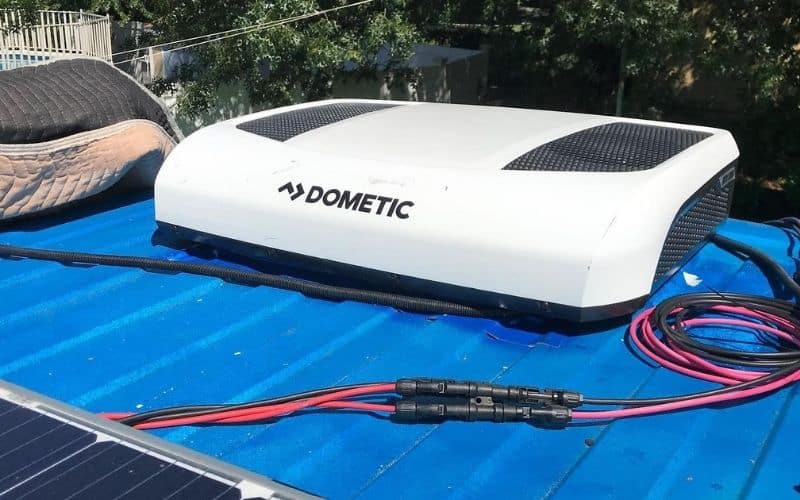
12 Volt RV air conditioners are sometimes referred to as “Swamp Cooler” as they are evaporative coolers.
They work by blowing hot, dry air through a moistened cooling pad. The wet pad absorbs the heat causing the water to evaporate and cool your RV.
This means you occasionally need to refill the reservoir to keep it operating correctly.
The Pros & Cons Of A Traditional 120 Volt Air Conditioner
There are pros and cons when deciding between cooling your RV with a traditional 120 Volt AC-powered air conditioner and a 12 Volt DC portable air conditioner.
120 Volt Air Conditioner Pros
Cons Of A 120 Volt Air Conditioner
The Pros & Cons Of A 12 Volt Battery Powered Air Conditioner
At the same time, considering 12 Volt DC air conditioners has a few pros and cons.
The Pros Of A 12 Volt Air Conditioner
The Cons Of A 12 Volt Air Conditioner
Running 12 Volt Air Conditioner On A Generator vs Battery Power
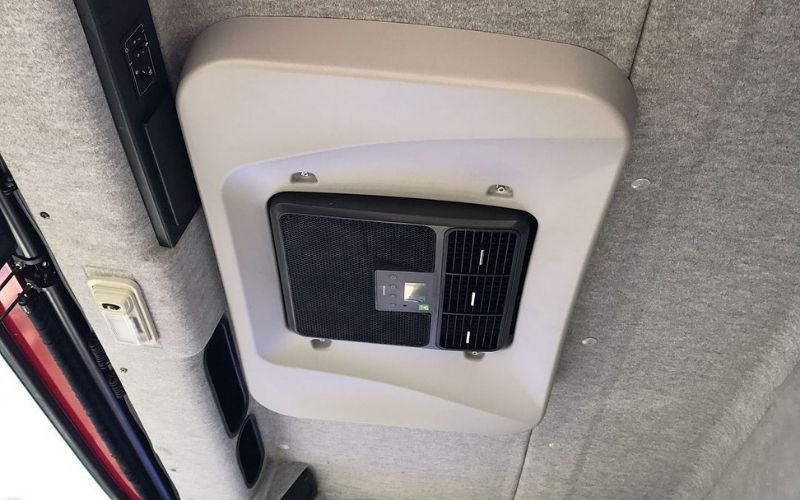
Many RV adventurers who like to boondock off the grid will bring a generator to supply electricity on demand.
So it only seems like a simple reach of logic to use it to power a traditional 120 Volt residential air conditioner.
The Drawbacks of Running An Air Conditioner Off A Generator
The problem is that even the quietest generator will still be loud, so most people don’t necessarily want to sleep with one running to enjoy the coolness of a 12 Volt DC air conditioner in their camper.
It’s also worth noting that even if you are content to live with the noise of a generator running and want to use a standard residential air conditioner, you will need an inverter.
This decreases efficiency in regards to the output performance of the generator while also adding in the cost of the inverter.
If anything happens to the inverter, the generator won’t be able to power the 120 Volt AC air conditioner.
The Benefits & Drawbacks Of Running A 12 Volt Air Conditioner Off Battery Power
There are some benefits when we take a closer look at DC-powered air conditioners and running them off a battery.
Right off the bat, it is much quieter than even the best-engineered generator.
You also don’t need to worry about using an inverter, as these specially designed portable RV air conditioners are designed to run on DC electricity.
This also translates into better efficiency, as nothing is lost to the inverter and the associated technology.
Of course, the concern here is that you have to worry about a limited power supply.
If you are connected directly to your RV’s house batteries, you also need to worry about draining down the power you would otherwise use for other things.
This can also be an issue if your camper’s house batteries are lead-acid, which can be damaged when drained below 50%. So, running a 12 Volt DC air conditioner off lithium-ion batteries is only advisable.
Best Off Grid 12 Volt Air Conditioners For Your Camper Van
When reviewing 12 Volt Air Conditioners, we tried to look for models that best cater to campers and RV travelers.
This means weeding out some heavy models in favor of more portable 12 Volt air conditioners engineered with campers and small travel trailers in mind.
1. The DOMETIC COOLAIR 2000 RTX 12V
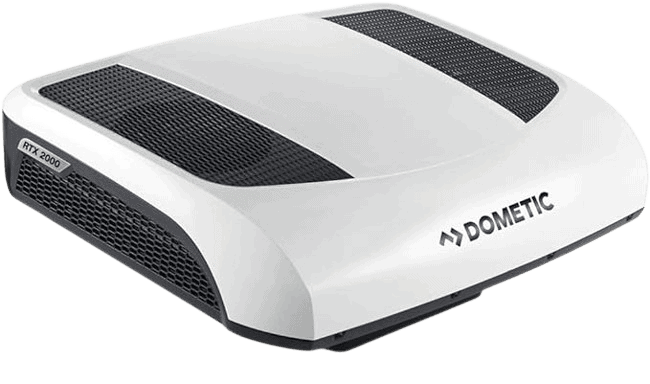
The Dometic Coolair 2000 RTX was designed to be roof mounted as either a replacement for an outdated RV rooftop air conditioner or a new install in a truck camper, pop-up camper or teardrop travel trailer.
This spares you from worrying about window or wall mounting the air conditioner, which would be an issue with a 120 Volt air conditioner.
It only uses 19 amps of energy in eco mode power consumption and ranges between 10 amps to 58 amps.
It best suits ambient temperatures between 41 and 126 degrees Fahrenheit. The Dometic Coolair 2000 RTX CoolAir was also engineered to be very quiet.
This is thanks in part to the two-cylinder compressor. It also features a large, high-contrast display that shows the individually adjustable air distribution, the four operating modes as well as the adaptive automatic mode of the air conditioner.
Pros
Cons
2. The NOMADIC COOLING 2000
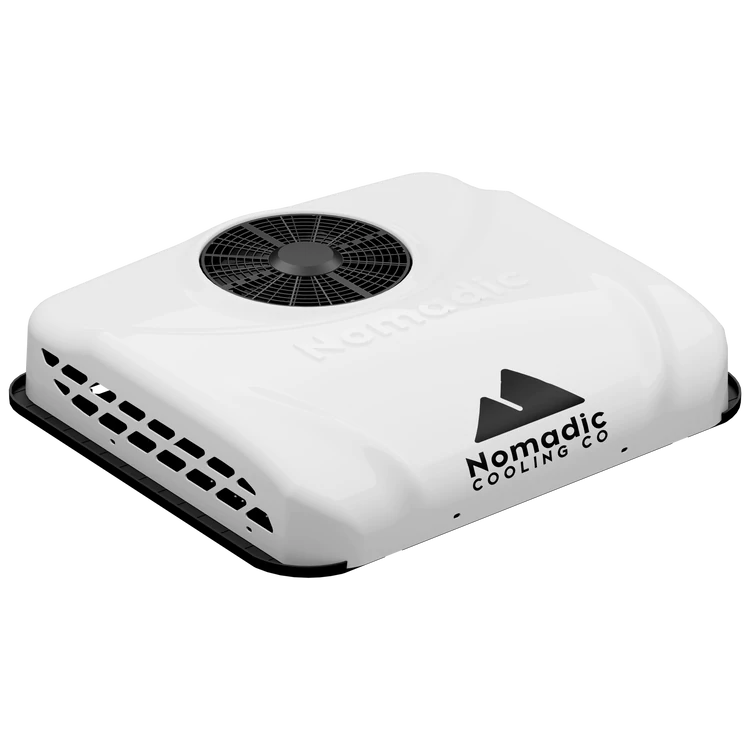
Right off the bat, the 9,553 BTU output of the Nomadic Cooling 2000 is impressive.
This is enough to cool any teardrop camper or large pop-up camper. 9,000 BTUs will even do a good job of cooling a small travel trailer in the 16-to-18-foot range or smaller.
It is designed as a replacement rooftop air conditioner in a Class B camper van.
While the Nomadic Cooling 2000 will work when connected to 12 Volt power, you will get the best performance out of powering it with a 24 Volt system.
Though this might be prohibitive for a smaller camper, still at 65 Amps with 12 Volt DC in the Max Cool setting, it is rated to handle up to 85 degrees Fahrenheit.
Pros
Cons
3. The Fresair 12 Volt Air Cooling Unit
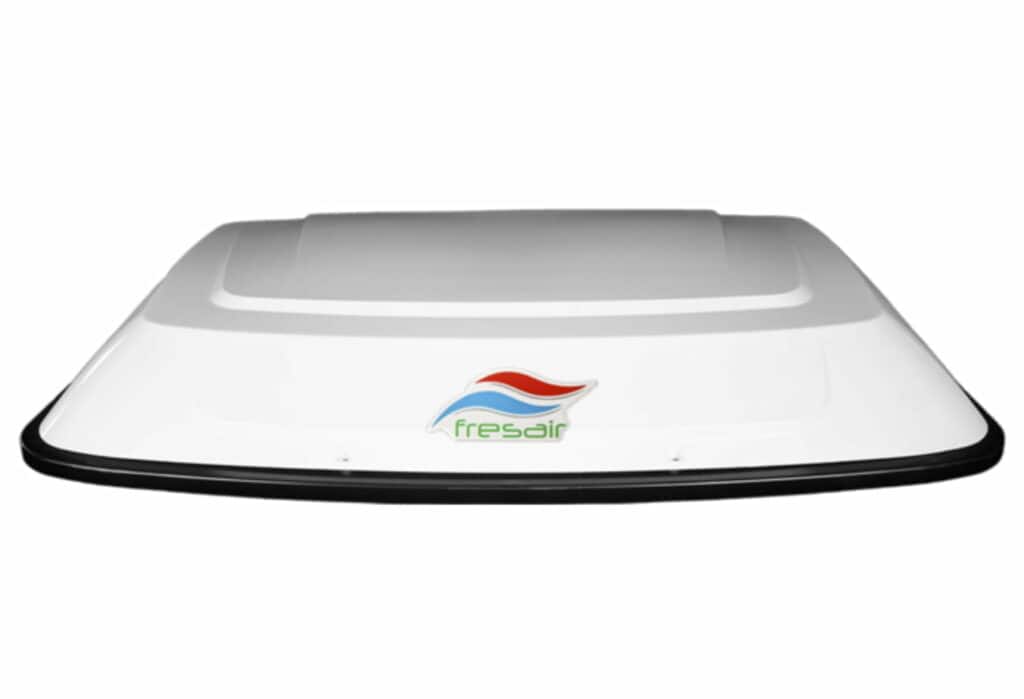
The Fresair cooling unit was designed to be an easy-to-install retrofit 12-volt air conditioner.
Its 14″ X 14″ footprint makes it easy to install in existing RV roof vents or as a replacement for a small outdated rooftop air conditioner.
The Fresair cooling unit is rated at 6,824 BTUs, which is sufficient for most campervans, teardrop campers, and small travel trailers.
It only weighs 25 pounds, making this 12 Volt RV air conditioner a great option for retrofit campers with a limited roof structure to support a heavier unit.
Pros
Cons
Frequently Asked Questions
Can I Use A Battery Power Stations To Run A DC Air Conditioner?
Recent advancements in battery technology have made Portable Power Stations or battery banks more accessible than ever before.
They can store impressive power for charging devices and running DC appliances.
Though most will only be able to run a portable DC air conditioner for 2 to 4 hours.
Is 12 Volt RV Air Conditioners Easy To Install?
Compared to rooftop models, 12 Volt RV air conditioners are relatively easy to install.
Many have dimensions that will fit into a typical 14″ X 14″ roof vent or small skylight.
Since they run on 12 Volt DC electricity, the wiring tends to be straightforward, and you don’t have to mess with an inverter.
What is a 12-volt air conditioner?
A 12-volt air conditioner is an amazing invention that can relieve cooling in various situations. It’s a great option for anyone looking to keep cool in remote locations without access to traditional power sources. As the name implies, it runs on 12 volts of electricity, making it perfect for use with car batteries or solar panels.
The most common type of 12-volt air conditioner is a portable unit for vehicles and boats. These units are relatively small but powerful enough to cool down the interior of even large vehicles. Some models even come with their built-in fans, allowing you to customize the temperature and airflow levels within your vehicle.
What are the benefits of using a 12-volt air conditioner?
A 12-volt air conditioner is incredibly efficient to keep your car, truck, RV, or boat cool and comfortable. The benefits of using a 12-volt air conditioner are numerous.
First and foremost, they are extremely energy efficient. This means you can run them for hours without raising your electric bill. They are much quieter than traditional AC units, so you won’t have to worry about loud noise disrupting your peace and quiet. Finally, they are incredibly easy to install and maintain; all you need is a power source, and you’re ready!
The 12-volt air conditioners offer a great way to stay cool in the summer without breaking the bank. They provide superior cooling performance with minimal energy consumption and noise pollution. If you’re looking for an affordable and effective way to beat the heat this summer, look no further than these amazing devices!
What are the different types of 12v portable air conditioners?
A few different types of 12v portable air conditioners are available on the market. The most popular type is the evaporative cooler, which uses water to cool the air and is great for areas with low humidity. They are also energy efficient and relatively inexpensive.
Another option is a compressor-based air conditioner, which works like a traditional AC unit but can be powered by a car battery or solar panel. These units are more expensive than evaporative coolers but provide much better cooling power.
Personal air conditioners use an ice pack to cool the air around you. These are convenient and effective but require frequent refilling of the ice packs to keep them working properly.
No matter what type of 12v portable air conditioner you choose, they all provide an excellent way to stay cool during the hot summer without relying on traditional AC units. With so many options available, you can find one that fits your needs and budget perfectly!
What are the best 12-volt air conditioners for vans?
Regarding 12-volt air conditioners for vans, you can’t go wrong with the Dometic B59516.XX1C0 Brisk II RV Air Conditioner. This lightweight and easy-to-install model offers superior cooling performance in an efficient package. It features a low amp draw, so you don’t have to worry about draining your battery or running up your power bill.
Plus, its sleek design fits perfectly in the tight spaces of most vans without taking up too much space.
Another great option is the Coleman Mach 15+ 48204C866 RV Air Conditioner. This model is designed to provide powerful cooling even in extreme temperatures, making it perfect for hot summer days on the road. It also features a quiet operation and low amp draw, so you won’t have to worry about noise or energy consumption while keeping your van cool and comfortable.
What are the best 12v air conditioners for RVs?
The best 12v air conditioners for RVs depend on the size of your RV and the type of climate you’re in. If you’re looking for a reliable, efficient option, I highly recommend the Dometic B59516.XX1C0 Brisk II air conditioner.
It has a high-performance motor ensures cool air is distributed quickly and evenly throughout your RV, so you can stay comfortable no matter how hot it gets outside. Plus, its sleek design fits any roof profile, ensuring a perfect fit every time.
If you’re looking for an energy-efficient option, the Coleman Mach 8 is great. It uses advanced technology to reduce energy consumption while providing powerful cooling performance. The unit also features an easy-to-use digital display with adjustable temperature settings to customize your cooling experience to suit your needs.
What are the best 12v air conditioners for campers?
The best 12v air conditioners for campers are the Dometic Brisk II RV Air Conditioner and the Advent Air RV Roof Top Air Conditioner.
The Dometic Brisk II is a powerful air conditioner that can cool your camper quickly and efficiently. It’s easy to install and comes with a built-in thermostat and fan speed control so you can customize your cooling experience. Plus, it has an adjustable louvre panel to direct the airflow exactly where you need it.
The Advent Air RV Roof Top Air Conditioner is another great option for campers. This unit is designed to fit standard roof openings and includes a built-in thermostat for precise temperature control. It has an ultra-quiet operation, so you won’t be disturbed by loud noises while trying to relax in your camper.
Conclusion
As 12-volt RV air conditioning technology keeps advancing, an array of innovative models are entering the market, providing more options for your camper or RV.
When choosing the perfect model, several factors come into play. For instance, if you have a teardrop trailer or pop-up camper with a limited reinforced roof structure, the Fresair 12 Volt Air Cooling Unit could be a fantastic match for your setup. Weighing just 25 pounds, it easily fits into any 14″ x 14″ opening, making it a great 12-volt RV air conditioner for lighter rigs.
On the other hand, if your travels often take you through scorching hot regions, like the deserts of the Southwestern United States, you’ll need a cooling system capable of handling extreme heat. In this case, the DOMETIC COOLAIR 2000 RTX 12V could be your rig’s ideal 12-volt RV air conditioner. Boasting a BTU rating of over 9,000, it’s designed to perform efficiently in temperatures exceeding 100 degrees Fahrenheit.
In short, consider your specific needs and rig requirements when exploring the ever-evolving world of 12-volt RV air conditioning technology, and you’re sure to find the perfect match for your home away from home.

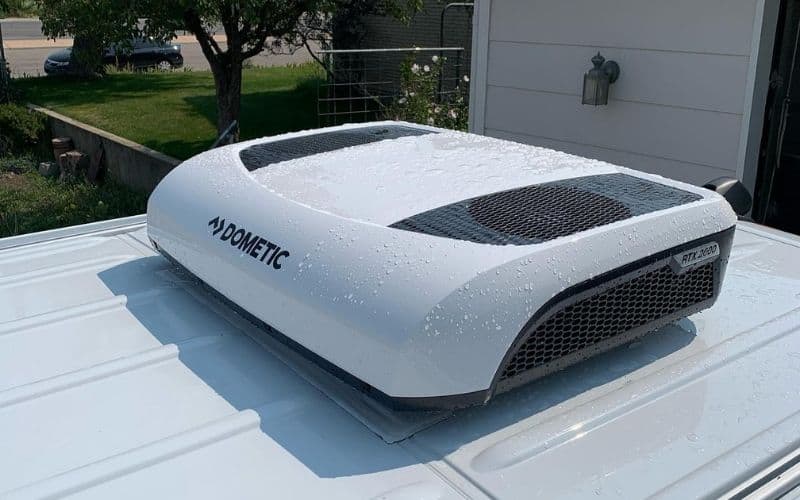



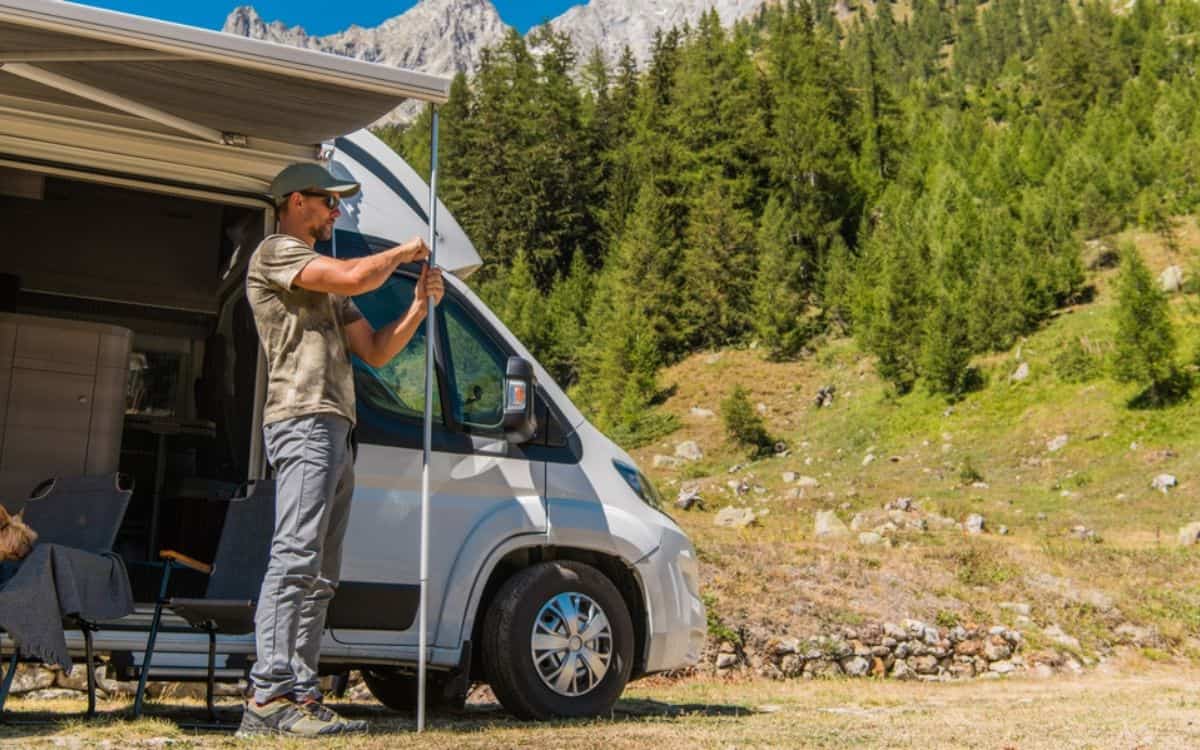


2 Comments
Steven
1 year agoHi I bought a 12v 13000 btu rooftop ac and I have it set up when all power goes threw the charger then charges the 138ah lithium battery ( might buy another for more power ) the charger is 50amp made for lithium batteries. I have a 110 plug for when I’m home and the voltage drops and eventually shuts the ac, and when van is on the alternator can keep the air conditioner running but the fan is inconsistent and doesn’t seem to be at full cooling potential , lastly when air conditioner is solely running on the one 138ah lithium battery the air conditioner only last 20 minutes . Do I need to a more powerful charger, a better alternator and and additional 138ah lithium battery? Do I need all theee of these things ? And will it be a significant difference
jr233
10 months agoonly the fresh air listed as cooler is a swamp type the others are compressor air conditioners, theirs also units designed for tractor trailer sleepers a lot less money you can install on van door or back of trailer